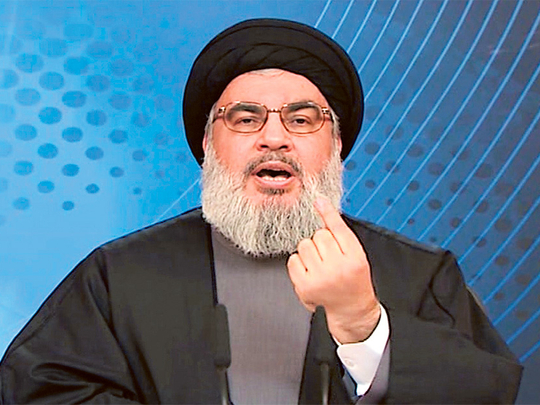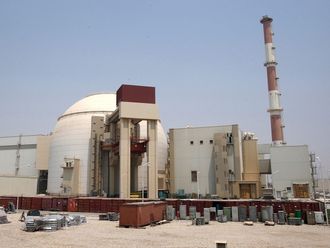
Dubai: In the wake of the 2006 war on Lebanon between the Lebanese Hezbollah militia and Israel, Arab countries had contrasting official stances.
Some countries supported Hezbollah while others criticised it for the loss of lives and damage inflicted on Lebanon through its “unexpected, inappropriate and irresponsible acts.”
However, Hezbollah’s leader Hassan Nasrallah won the hearts and minds of millions of Arabs who saw in him the best answer to Israel’s arrogance and aggression.
Thanks to a good projection of his image and a wide dissemination of his speeches, he was given superstar status in the Arab world and beyond, mainly in Africa.
His pictures were ostentatiously displayed in several exhibitions and facilities and the brand labelling compared his pose of glamour to that of Che Guevara.
In Cairo, dates were named after him in a glorious tribute paid only once before him to a Lebanese national, the sultry Nancy Ajram.
His arguments were accepted as facts and his positions as perfect.
Fast forward into the present day, and Nasrallah is severely criticised in his own home country Lebanon and throughout the Arab world.
The once charismatic figure whose words were highly respected is today harshly criticised by Lebanese ministers who accuse him of disregarding the interests of Lebanon to promote an Iranian agenda with negative repercussions on Lebanese nationals, particularly the hundreds of thousands working in the Gulf Cooperation Council (GCC) countries.
Ministers and officials said that they were shocked by Nasrallah’s role as a proxy for Iran and that they were appalled by the charges he levelled against Saudi Arabia in his latest speech on Friday.
Nasrallah accused Saudi Arabia of spreading extremist ideology in the Arab world and blasted it for leading Operation Storm of Resolve, the military operations in Yemen against the Al Houthis.
Nasrallah and Iran openly support Al Houthis in Yemen.
Justice Minister Ashraf Rifi said Nasrallah should be “ashamed” of his attacks on Riyadh, “which has supported [Lebanon’s] state institutions and has not paid money to [any particular] side or sect and has not created militias,” the Lebanese Daily Star reported.
Rifi described Hezbollah as a “mere tool” of Iran that “sacrifices itself and its people for the sake of a failing project.”
“We are facing a regional plot that wrongly believes it can control the Arab world and unfortunately a Lebanese group is being used as the tool to that end,” Rifi said during a rally in Tripoli. “Hezbollah is turning Lebanon into an operations room to spread Iranian hegemony.”
Rifi said Lebanese-Saudi fraternity ought to be safeguarded. “We reject any infraction of those ties,” he said, quoted by the daily.
“The Kingdom of Saudi Arabia has proven throughout its historical relations with Lebanon that it is the friendly state that has long stood by our country in all fields,” he said.
‘Ashamed’
“Saudi Arabia has supported the legitimate Lebanese security and military institutions, in order to contribute to the preservation of the sovereignty of Lebanon and unity. It did not pay money for a segment or a sect and it did not establish a militia. Whoever insults Saudi Arabia should be ashamed and should know that it is no longer possible to mislead the Lebanese in such a way,” the minister said.
Progressive Socialist Party leader Walid Jumblatt said the remarks made by Nasrallah against Saudi Arabia were “foolish” and reiterated his support for the Saudi-led military campaign in Yemen.
“The foolish tone of Sayyed Nasrallah is not beneficial,” Jumblatt said in media comments. “We should rather return to calm and to the GCC initiative that King Salman Bin Abdul Aziz is insisting on as a political solution framework in Yemen,” he said, quoted by the Daily Star.
Jumblatt said both Iran and Hezbollah were shocked by the Saudi decision to launch the military campaign against the Al Houthis, which explained the reaction against it.
“What is with Nasrallah? Where does he wish to take Lebanon and the Lebanese through his tense speeches against Saudi Arabia?” Jumblatt asked. “Has he taken into consideration the consequences of his words on the lives of around 500,000 [Lebanese] in Saudi Arabia?”
According to the Daily Star, even Hezbollah’s close allies distanced themselves from Nasrallah’s remarks, with Free Patriotic Movement official Alain Aoun announcing that his group’s alliance with Hezbollah did not automatically entail that the FPM shared the party’s views on Yemen.
“We do not have the same considerations as Hezbollah regarding Yemen that leads us to share the same views as the party,” Aoun told Al Jadeed TV. “Our alliance with Hezbollah is a purely political one that does not extend beyond Lebanon’s borders.”












